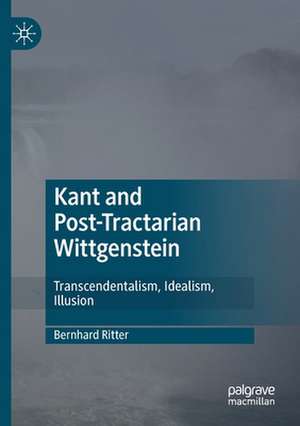Kant and Post-Tractarian Wittgenstein: Transcendentalism, Idealism, Illusion
Autor Bernhard Ritteren Limba Engleză Paperback – 14 aug 2021
The closeness of Kant and post-Tractarian Wittgenstein does not exist between their arguments or the views they upheld, but rather in their affiliation against forms of transcendental realism and empirical idealism. Ritter skilfully challenges several dominant views on the relationship of Kant and Wittgenstein, especially concerning the cogency of Wittgenstein-inspired criticism focusing on the role of language in the first Critique, and Kant's alleged commitment to a representationalist conception of empirical intuition.
| Toate formatele și edițiile | Preț | Express |
|---|---|---|
| Paperback (1) | 699.28 lei 43-57 zile | |
| Springer International Publishing – 14 aug 2021 | 699.28 lei 43-57 zile | |
| Hardback (1) | 704.75 lei 43-57 zile | |
| Springer International Publishing – 13 aug 2020 | 704.75 lei 43-57 zile |
Preț: 699.28 lei
Preț vechi: 822.68 lei
-15% Nou
Puncte Express: 1049
Preț estimativ în valută:
133.82€ • 138.92$ • 111.59£
133.82€ • 138.92$ • 111.59£
Carte tipărită la comandă
Livrare economică 24 martie-07 aprilie
Preluare comenzi: 021 569.72.76
Specificații
ISBN-13: 9783030446369
ISBN-10: 3030446360
Pagini: 346
Ilustrații: XXI, 346 p. 6 illus.
Dimensiuni: 148 x 210 mm
Greutate: 0.49 kg
Ediția:1st ed. 2020
Editura: Springer International Publishing
Colecția Palgrave Macmillan
Locul publicării:Cham, Switzerland
ISBN-10: 3030446360
Pagini: 346
Ilustrații: XXI, 346 p. 6 illus.
Dimensiuni: 148 x 210 mm
Greutate: 0.49 kg
Ediția:1st ed. 2020
Editura: Springer International Publishing
Colecția Palgrave Macmillan
Locul publicării:Cham, Switzerland
Cuprins
Part I: Mirages of Metaphysical Language.- 1. Wittgenstein on 'Grammatical' and 'Metaphysical' Propositions.- 2. The Question of Linguistic Idealism.- 3. Wittgenstein and What We Can Say.- 4. Language and Communication in Kant's Theoretical Philosophy.- 5. Transcendental Illusion in the First Antinomial Conflict.- 6. Kant's Transcendental Idealism.- Part II: Kant's Argument Against Problematic Idealism.- 7. The Position of Problematic Idealism.- 8. Scepticism and Idealism in Descartes.- 9. Transcendental Proofs and Indubitability.- 10. The Subject in the Refutation of Idealism.- 11. Transcendental Realism and the Fourth A-Paralogism.- Part III: Wittgenstein: Idealism, Solipsism, and Scepticism.- 12. Solipsism in The Blue Book.- 13. Use as Subject and Use as Object of 'I' Revisited.- 14. Idealism/Solipsism in the Investigations.- 15. On Certainty and Metaphysical Doubt.- Part IV: Limits of Transcendentalism.- 16. Kant's Second Analogy and the Schema of Causality.- 17. 'Perception' in §26 of the Transcendental Deduction.- 18. Wittgenstein on Private Ostensive Definition.- 19. A Prussian Wittgenstein and a Viennese Kant?.
Recenzii
Notă biografică
Dr Bernhard Ritter is Erwin Schrödinger Research Fellow at the University of Paris 1 Pantheon-Sorbonne, the Center for Subjectivity Research of the University of Copenhagen, and the University of Graz. He has published articles on Kant and Wittgenstein and co-edited Wittgenstein's Whewell's Court Lectures: Cambridge 1938–1941 (2017)."
Textul de pe ultima copertă
"Ritter provides a lucid and fascinating map of the affinities and contrasts between these two philosophers, showing us the limits of contemporary readings of each, and pressing analytic Kantianism forward. A book with lessons worth learning.”
—Juliet Floyd, Professor of Philosophy, Boston University, USA
This book suggests that to know how Wittgenstein’s post-Tractarian philosophy could have developed from the work of Kant is to know how they relate to each other. The development from the latter to the former is invoked heuristically as a means of interpretation, rather than a historical process or direct influence of Kant on Wittgenstein. Ritter provides a detailed treatment of transcendentalism, idealism, and the concept of illusion in Kant’s and Wittgenstein’s criticism of metaphysics. Notably, it is through the conceptions of transcendentalism and idealism that Wittgenstein’s philosophy can be viewed as a transformation of Kantianism. This transformation involves a deflationary conception of transcendental idealism along with the abandonment of both the idea that there can be a priori 'conditions of possibility' logically detachable from what they condition, and the appeal to an original ‘constitution’ of experience.
The closeness of Kant and post-Tractarian Wittgenstein does not exist between their arguments or the views they upheld, but rather in their affiliation against forms of transcendental realism and empirical idealism. Ritter skilfully challenges several dominant views on the relationship of Kant and Wittgenstein, especially concerning the cogency of Wittgenstein-inspired criticism focusing on the role of language in the first Critique, and Kant's alleged commitment to a representationalist conception of empirical intuition.
—Juliet Floyd, Professor of Philosophy, Boston University, USA
This book suggests that to know how Wittgenstein’s post-Tractarian philosophy could have developed from the work of Kant is to know how they relate to each other. The development from the latter to the former is invoked heuristically as a means of interpretation, rather than a historical process or direct influence of Kant on Wittgenstein. Ritter provides a detailed treatment of transcendentalism, idealism, and the concept of illusion in Kant’s and Wittgenstein’s criticism of metaphysics. Notably, it is through the conceptions of transcendentalism and idealism that Wittgenstein’s philosophy can be viewed as a transformation of Kantianism. This transformation involves a deflationary conception of transcendental idealism along with the abandonment of both the idea that there can be a priori 'conditions of possibility' logically detachable from what they condition, and the appeal to an original ‘constitution’ of experience.
The closeness of Kant and post-Tractarian Wittgenstein does not exist between their arguments or the views they upheld, but rather in their affiliation against forms of transcendental realism and empirical idealism. Ritter skilfully challenges several dominant views on the relationship of Kant and Wittgenstein, especially concerning the cogency of Wittgenstein-inspired criticism focusing on the role of language in the first Critique, and Kant's alleged commitment to a representationalist conception of empirical intuition.
Caracteristici
Challenges several dominant views on the relationship between Kant and Wittgenstein Develops a novel interpretation of Kant's Refutation of Idealism as crucially concerned with the temporal determination of the owner of empirical representations Offers a new discussion of Wittgenstein's distinction between the use as subject and use as object of "I" in the light of a neglected manuscript, MS 147
